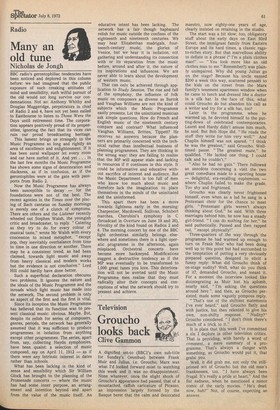Radio
Many an old tune
Nicholas de Jongh
BBC radio's gerontophiliac tendencies have been noticed and deplored in this column before: we had imagined that the public exposure of such creaking attitudes of mind and sensibility, such wilful pursuit of the old would not long survive our condemnations. Not so: Anthony Whitby and Douglas Muggeridge, perpetrators in chief of Radio 2 and 4, have not yet been exiled to Eastbourne to listen to Those Were the Days until retirement time. The corporation appears positively proud of its propensities, ignoring the fact that its vices can ruin our proud broadcasting heritage.
This lament brings us strangely to the Music Programme so long and rightly an area of excellence and enlightenment. If it has been aural wallpaper let every room and car have surfeit of it. And yet . . . in the last few months the Music Programme has shown some signs of deterioration and slackness, as if in confusion, as if the gerontophiles were at the gate with passports from Radio 2.
Now the Music Programme has always been susceptible to decay — for the foundations were not of the best. The recent agonies in the Times over the placing of Bach cantatas on Sunday mornings is merely one of a clutch of symptoms. There are others and the Listener recently wheeled out Stephen Walsh, the youngish critic and broadcaster, to reply. " Catering as they try to do for every colour of musical taste," wrote Mr Walsh with every concession to mixed metaphor, "except pop, they inevitably overbalance from time to time in one direction or another. There may be a consistent trend, as had been claimed, towards light music and away from heavy classical and modern works but the evidence is not conclusive." Lord Hill could hardly have done better.
Such a superficial declaration obscures two problems. It ignores the nature and the ideals of the Music Programme and the inroads which light music has made into the network. The second problem is only an aspect of the first and the first is vital.
Since its inception the Music Programme has believed that its function was to present classical music: obvious. Maybe. But, despite its relish for series of composers, genres, periods, the network has generally assumed that it was sufficient to produce programmes in isolation from anything except other programmes. The series, apart from, say, collecting Haydn symphonies, have been quaint: a selection of music composed, say on April 11, 1912 — as if there were any intrinsic interest in dates rather than schools.
What has been lacking is the kind of sense and sensibility which Sir William Glock has brought to the planning of the Promenade concerts — where the music has had some inner purpose, an arrangement and intention beyond and apart from the value of the music itself. An educative intent has been lacking. The network has a fair though haphazard relish for music outside the confines of the eighteenth and nineteenth centuries. We may hear Elizabethan madrigals, fourteenth-century music, the glories of Venice, but we hear it in isolation, not gathering and understanding its connection with or its separation from the music before, around and after it, the nature of its inspirations and influences. We are never able to learn about the development of western music.
That can only be achieved through application to Study Session. The rise and fall of the symphony, the influence of folk music on composers as diverse as Bartok and Vaughan Williams are not the kind of subjects which the Music Programme easily presents. Let the uninitiated musician ask simple questions. How do French and English music of the nineteenth century compare and contrast? What influenced Vaughan Williams, Britten, Tippett? He receives no answers because the planners are primarily concerned with the technical rather than intellectual business of planning programmes. They are thinking in the wrong way: they are failing to realise that the MP will appear stale and lacking in resources if it continues in this style. It could be informative and educative without sacrifice of interest and audience. But the Music Department is too full of men who know too much about music and therefore lack the imagination to place themselves in the minds of the uninitiated and the uninformed.
This apart there has been a move towards lightness early in the morning: Charpentier, Macdowell, Sullivan, Schubert marches, Cherubini's symphony in C (broadcast in Overture on June 19 and 26), frivolity of the kind found on Radios 2 and 4. The morning concert by one of the BBC light orchestras similarly belongs elsewhere and sometimes there is a light operatic programme in the afternoon, again misplaced. Orchestral concerts have become more hackneyed. Modifications suggest a destructive tendency as if the MP was eventually to be transformed to 1,000 great tunes you love. This deterioration will not be averted until the Music Programme men realise that they must radically alter their concepts and conceptions of what the network should try to present and achieve.










































 Previous page
Previous page